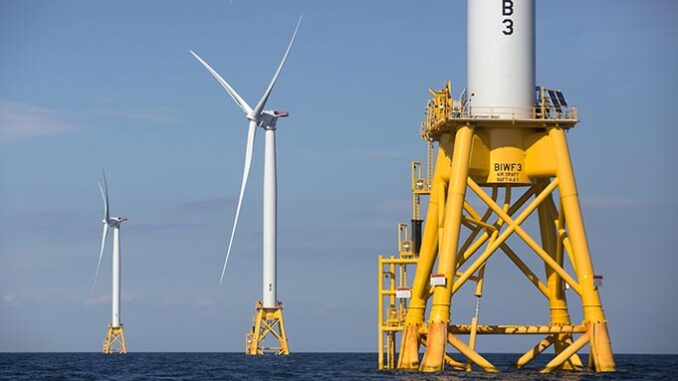
RALEIGH —Democratic North Carolina Gov. Roy Cooper issued an executive order on June 9 directing agencies in his administration to develop wind-energy infrastructure off the coast. Republicans, meanwhile, blasted the plan, saying the focus instead should be on affordable, reliable options, especially natural gas.
“Offshore wind power will help North Carolina create jobs and generate economic development while helping us transition to a clean energy economy,” said Cooper in a press release on Executive Order 218. “North Carolina’s national leadership in clean energy and manufacturing plus our highly trained workforce create a strong business environment for offshore wind supply chain and manufacturing companies.”
Section 1 of the order lays out targets for energy production from wind energy, saying the state “will strive for development of 2.8 gigawatts (GW) of offshore wind energy resources off the North Carolina coast by 2030 and 8.0 GW by 2040.”
The order also creates two positions, one at the Department of Commerce and the other at the Department of Military and Veterans Affairs, to help implement the plan.
“With this Executive Order, Governor Cooper attempts to commit North Carolina to a future dependent upon unreliable, outrageously expensive, environmentally suspect, and socially irresponsible offshore wind power,” Lt. Gov. Mark Robinson, a Republican, said in a response.
Robinson said that wind power is “not the economic gold-mine the Cooper administration would have us believe,” citing information from the Energy Information Administration that shows offshore wind is 3.4 times more expensive than natural gas. This comes to $122.25 per megawatt-hour for offshore wind power and $38.07 for natural gas.
In the release, Robinson also criticized Cooper for going around him and the Energy Policy Council that he leads.
“North Carolina has a mechanism established by state law for studying energy issues facing the State and advising the General Assembly: the bipartisan Energy Policy Council, of which I am the Chairman,” Robinson said. “However, Governor Cooper has decided that he alone establishes the energy policies of North Carolina with this Executive Order, which establishes yet another ‘task force’ composed solely of appointees chosen by him, but fails to even mention the Energy Policy Council.”
The rejection of Dionne Delli-Gatti, Cooper’s nominee to be the state’s Department of Environmental Quality secretary, by the N.C. Senate the week before is emblematic of the partisan divide on energy in North Carolina. Cooper named her as North Carolina clean energy director immediately after she was rejected by Republicans.
For Republicans, the most crucial issue on North Carolina’s energy future appears to be how to end the state’s reliance on a single pipeline, especially after the Colonial Pipeline hack, and to expand natural gas capacity in general. Republicans said Delli-Gatti was unable to provide even the most basic understanding of the issue.
“North Carolina’s future, not to mention lights, heat, and air conditioning in millions of homes, is at risk because of the state’s full reliance on a single natural gas pipeline,” Sen. Norm Sanderson (R-Pamlico) said in a release explaining her rejection. “Ms. Delli-Gatti could not articulate the Cooper Administration’s natural gas strategy, which she would presumably lead or at least be heavily involved in, nor was she informed about a major pipeline that her own agency rejected 48 hours later. Given the importance of this issue, that’s disqualifying.”
Delli-Gatti’s inability to answer these questions dovetails with the belief that North Carolina Democrats see natural gas, and other fossil fuels, as a part of the energy past as they implement their Clean Energy Plan. A major part of this plan involves teaming with their regional and national counterparts to create offshore wind-power capabilities.
An October 2020 memorandum of understanding between Cooper, Maryland Gov. Larry Hogan and Virginia Gov. Ralph Northam created a framework for the three states to cooperatively promote, develop and expand offshore wind energy. The Biden administration is also putting a heavy focus on offshore wind.
A 200-square-mile area around Kitty Hawk has already been identified for development and reviewed by the U.S. Bureau of Ocean Energy Management and the developer, Avangrid Renewables, including environmental studies and public engagement processes.
The order expires on Dec. 24, 2024, Cooper’s last day in office.


